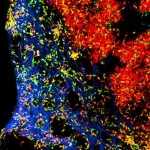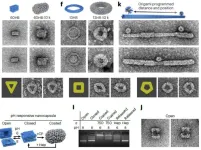(Press-News.org) The cells of the immune system circulate mainly in the blood and migrate into the body's tissues after an inflammation. Some types of immune cells, however, are permanently located in the tissues, where they come together to form three-dimensional networks.
How do these networks form and how are they maintained? For the long-lived macrophages (phagocytes), the answer is already known: They settle in so-called niches. These are environments of connective tissue cells that supply the macrophages with nutrients and keep them alive.
A team led by Professors Georg Gasteiger, Dominic Grün and Wolfgang Kastenmüller from the Institute of Systems Immunology at Julius-Maximilians-Universität Würzburg (JMU) / Max Planck Research Group has now turned its attention to a related type of immune cells, the so-called dendritic cells.
These immune cells are essential for the control of immune responses because they are at the first line of defense of the immune system: They recognize foreign structures, take them in and process them into a kind of mugshot. They then present the photo to other immune cells and trigger a specific immune response, for example against pathogens or cancer cells.
Dendritic cells migrate through the tissue
The special thing about dendritic cells: They only live for about a week and during this time they continuously migrate through the body's tissues. “In this respect, it was clear that the classic niche concept would not work here" , says Wolfgang Kastenmüller.
The JMU team found a completely new concept for this, according to which three-dimensional cell networks can organize themselves: Dendritic cells orient themselves to the blood vessels and migrate one after the other along their outer wall – similar to children walking in single file. The blood vessels thus determine the three-dimensional arrangement of the cells.
Cytokines keep the cells together
"We wanted to understand how this process is regulated and how the cells manage to close gaps in their network," explains Dr. Milas Ugur, a scientist in Professor Kastenmüller's group. Closing such gaps is important because otherwise the immune defense no longer functions optimally.
As the JMU team reports in the journal Immunity, it is due to a locally acting cytokine, the FLT3 ligand, that the dendritic cells always stay close together during their developmental migration.
The cytokines are continuously and evenly produced locally and consumed by the dendritic cells. If there are gaps in the group, more cytokines are available for the isolated dendritic cells. This surplus speeds them up in their development and movement and helps them to reconnect with the group. When the cells have moved up, they have a little less cytokines available again due to competition from their neighbours. Accordingly, they slow down their developmental speed.
Of prognostic value for tumour diseases
These findings are for example important for cancer therapy: dendritic cells have a high prognostic value for tumour diseases: The higher their abundance in the tumour, the better the prognosis for the patient. This is especially true after immunotherapy.
"Increasing our basic insights on dendritic cell biology will help us to restore the networks of these cells in tumours and thereby tailor optimal therapies in the future" explains Kastenmüller.
How the researchers are moving forward
The JMU researchers’ data so far is based on the analysis of lymph nodes from animal models. The team next wants to test whether the same principles of network organisation of dendritic cells apply to all tissues and also in humans.
The work described was done in cooperation with researchers from the Würzburg Helmholtz Institute for RNA-based Infection Research (HIRI) and with scientists from France and Japan.
Immunology in Würzburg
Würzburg University Medical Center has distinguished itself as an important research location in the field of immunology and has greatly expanded these competencies in recent years. In numerous institutes and chairs, scientists are working on better understanding the immune system and using it to fight diseases. In doing so, they cooperate closely with other researchers in Germany and worldwide. https://www.med.uni-wuerzburg.de/en/immunology/home/
END
Immune cells in single file
2023-07-17
ELSE PRESS RELEASES FROM THIS DATE:
New research shows babies’ immunological weak spot and strength
2023-07-17
NEW YORK, NY--A pair of new studies led by researchers at Columbia University explains why babies get so many common respiratory infections and identifies a specialized cluster of immune cells found only in babies that help them better cope with new pathogens.
“We know little about how the immune system develops throughout life, and most of what we know about immune system development in children comes from animal studies,” says Donna Farber, PhD, an expert in immune system development at Columbia University ...
National Poll: Less than half of parents utilize patient portal benefits for their children
2023-07-17
ANN ARBOR, Mich. – For many busy families, online access to a child’s health provider for medical advice, health records or prescription refills is likely a convenient option.
Yet, only 43% of parents have set their child up for a patient portal – an online tool allowing communication between patients and medical providers – and others may not be optimizing portal use, suggests the University of Michigan Health C.S. Mott Children’s Hospital National Poll on Children’s Health.
“Patient portals offer a wide range of benefits, including decreasing unnecessary hassles for providers and patients and improving access to both the medical ...
The missing Americans: Unprecedented US mortality far exceeds other wealthy nations
2023-07-17
FOR IMMEDIATE RELEASE
Monday, July 17, 2023
Contact:
Jillian McKoy, jpmckoy@bu.edu
Michael Saunders, msaunder@bu.edu
##
The Missing Americans: Unprecedented US Mortality Far Exceeds Other Wealthy Nations
A new study found that more than one million US deaths a year—including many young and working-age adults—could be avoided if the US had mortality rates similar to its peer nations.
In 2021, 1.1 million deaths would have been averted ...
Addressing the future challenges of global surface water quality
2023-07-17
As the world's population continues to grow, ensuring access to clean and safe water has become an increasingly important concern, yet little is known about how surface water quality will change in the future. Recent scientific research has shed light on the potential challenges that surface water quality may face in the coming years, particularly in Sub-Saharan Africa. “While surface water quality is projected to improve in most developed countries, there is an important caveat: the outlook for the poorest nations is bleak”.
A recent study, published in Nature Water, has projected an increase in surface water pollution in Sub-Saharan Africa. These findings ...
Study finds how to reduce risk of kids playing with a found gun
2023-07-17
COLUMBUS, Ohio – In a lab at The Ohio State University masquerading as a playroom, pairs of kids ages 8 to 12 participating in a study found a variety of toys and games to play with – as well as a mysterious file cabinet.
Inside one of the drawers of the unlocked cabinet were two disabled 9-mm handguns.
As they played in the room, nearly all the children eventually found the guns. But some kids in the study were much more likely to tell an adult they found a gun, less likely to touch the gun, and were less reckless if they did touch it – and they were the kids who had watched a one-minute gun safety video a week earlier.
The study may be the ...
Trading sickness for health: Swapping brain cells points to new Huntington's therapies
2023-07-17
NNew research appearing in the journal Nature Biotechnology answers important questions about the viability of treatments that seek to replace diseased and aged cells in the central nervous system with healthy ones. Its findings have implications for a number of neurological and psychiatric disorders—including Huntington’s disease, amyotrophic lateral sclerosis (ALS), and schizophrenia—that have been linked to glia, a population of cells that support brain health and function.
“A broad variety of disorders we associate with neuronal loss now appear to be caused ...
Researchers craft ‘origami DNA’ to control virus assembly
2023-07-17
Griffith University researchers have played a key role in using DNA ‘origami’ templates to control the way viruses are assembled.
The global team behind the research, published in Nature Nanotechnology, developed a way to direct the assembly of virus capsids – the protein shell of viruses - at physiological conditions in a precise and programmable manner.
Dr Frank Sainsbury and Dr Donna McNeale from the Griffith Institute for Drug Discovery were part of the research team and said forcing viruses to assemble onto DNA folded into different shapes “like origami” was a question that this project answered.
“We achieved control over the virus protein ...
Cap top 20% of energy users to reduce carbon emissions
2023-07-17
Consumers in the richer, developed nations will have to accept restrictions on their energy use if international climate change targets are to be met, warn researchers.
The big challenge is to identify the fairest and most equitable way that governments can curtail energy use, a process known as energy demand reduction.
Writing in the journal Nature Energy, the research team - led by Milena Büchs, Professor of Sustainable Welfare at the University of Leeds - analysed several scenarios to identify a potential ...
Excess mortality with Alzheimer disease and related dementias as an underlying or contributing cause during pandemic
2023-07-17
About The Study: This study found that large increases in mortality with Alzheimer disease and related dementias as an underlying or contributing cause of death occurred in COVID-19 pandemic year 1 but were largely mitigated in pandemic year 2. The most pronounced declines were observed for deaths in nursing home/long-term care settings. Conversely, excess deaths at home and in medical facilities remained high in year 2.
Authors: M. Maria Glymour, Sc.D., of the Boston University School of Public Health ...
Comparison of history of present illness summaries generated by a chatbot and senior internal medicine residents
2023-07-17
About The Study: History of present illnesses generated by a chatbot or written by senior internal medicine residents were graded similarly by internal medicine attending physicians. These findings underscore the potential of chatbots to aid clinicians with medical documentation.
Authors: Ashwin Nayak, M.D., M.S., of Stanford University in Stanford, California, is the corresponding author.
To access the embargoed study: Visit our For The Media website at this link https://media.jamanetwork.com/
(doi:10.1001/jamainternmed.2023.2561)
Editor’s Note: Please see the article for additional information, including other authors, author contributions and affiliations, ...


